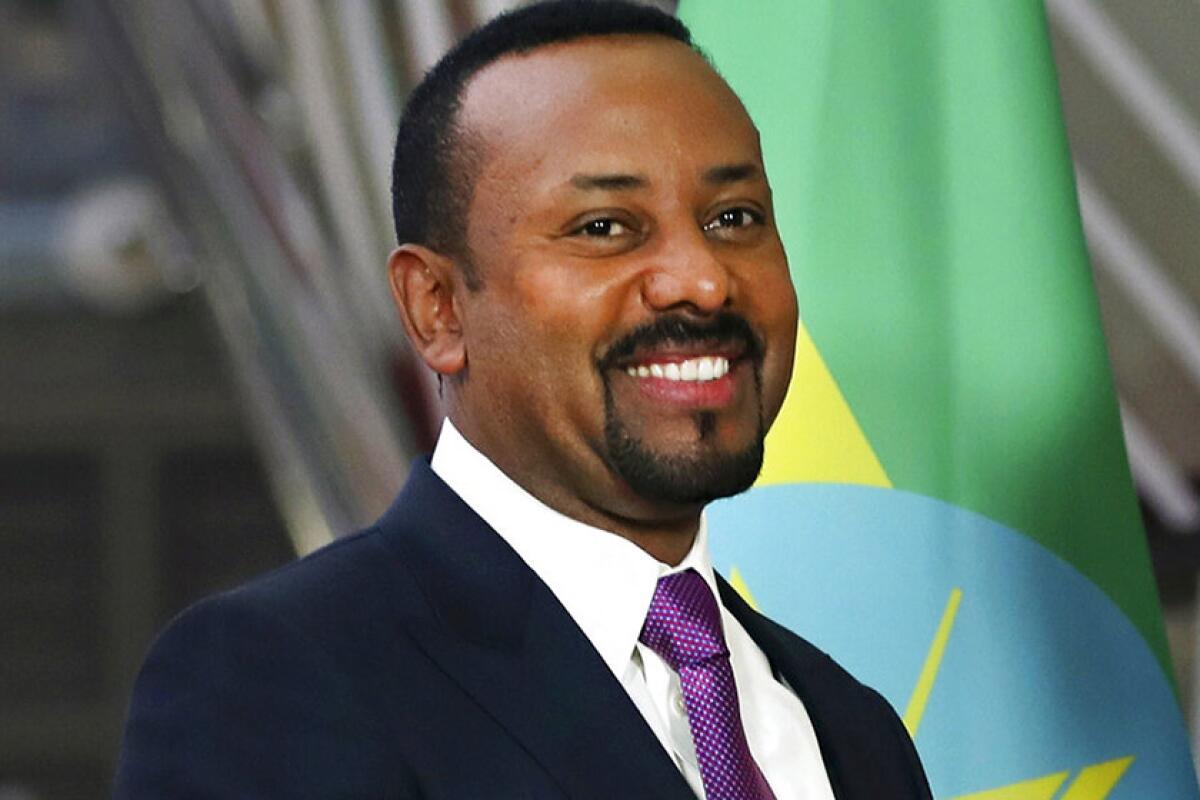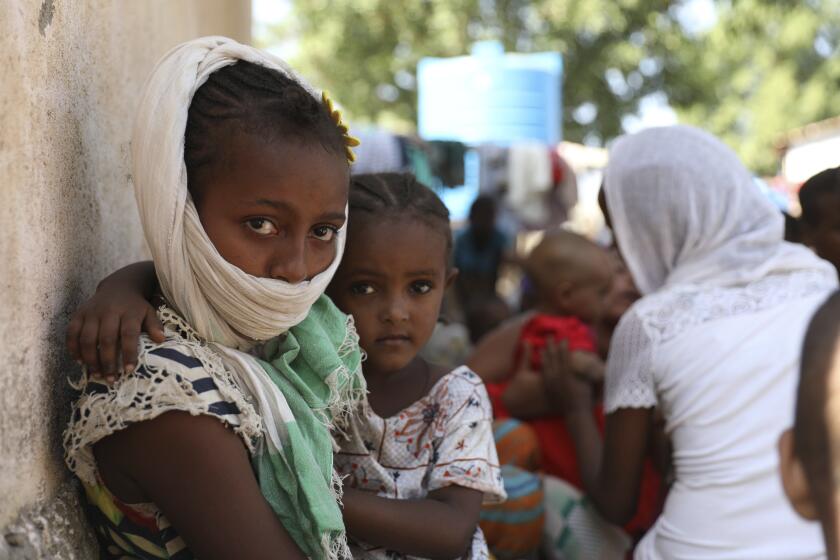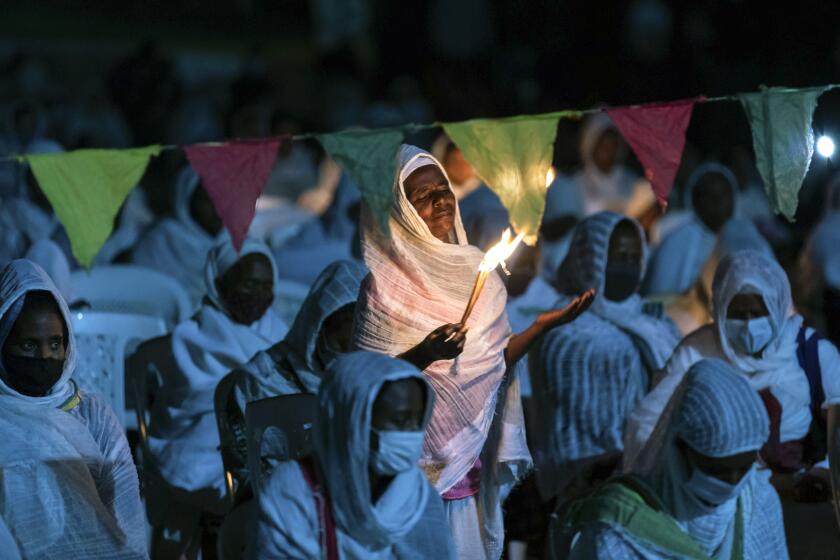In Ethiopia, a Nobel Peace laureate goes to war

- Share via
NAIROBI, Kenya — Last year he won the Nobel Peace Prize. This year, he went to war.
But to those familiar with Ethiopian Prime Minister Abiy Ahmed’s life and political career, his morals haven’t changed.
A onetime soldier, he has ignited a refugee crisis that may further unsettle the precarious Horn of Africa. A Pentecostal Christian in a religiously diverse nation — still the youngest leader on the continent at age 44 — he’s shown a penchant for shaking up the status quo.
Shaped by conflict abroad and ethnic divisions at home, Abiy — who in his Nobel acceptance speech said war creates savage men — responded to an attack last month by an armed separatist movement in the nation’s northern Tigray region with a military campaign of his own. Experts say the resulting violence is the inevitable result of Abiy’s attempt to unify under a central government the many ethnic groups of Africa’s second most populous nation.
“Ethiopia’s federalism is unique,” said Ken O. Opalo, a professor at Georgetown University’s School of Foreign Service. “Nowhere else in Africa do you have subnational units that are allowed to run their own militias and police forces. Regional governments are allowed to arm themselves — and that is part of Abiy’s challenge.”
After the Tigray People’s Liberation Front attacked federal military bases in early November, Abiy retaliated with an air and ground campaign meant to oust the TPLF. The conflict has killed hundreds of soldiers on both sides as well as thousands of civilians. Nearly 2 million people are in need of food assistance in and around Tigray, and an estimated 1 million people have been displaced, according to the United Nations. At least 45,000 Ethiopians — mostly Tigrayans — have fled as refugees to neighboring Sudan.
On Nov. 28, Abiy declared victory after his Ethiopian National Defense Force seized the Tigrayan regional capital of Mekele. But reports suggest the fighting is far from over, with the TPLF preparing for a protracted insurgency that could drag on for months or even years if Abiy’s military doesn’t manage to swiftly apprehend its leaders.
The irony of a recent Nobel Peace Prize winner heading to war has not been lost on observers. Some believe the prize is intended to nudge leaders in the right direction.
President Obama received his prize after just one year in office. Cited for his calls of increased cooperation between the Muslim world and the West, he would go on to launch 542 drone strikes across the Middle East and Africa that killed at least 324 civilians in Muslim countries. The ouster of Libyan dictator Moammar Kadafi that Obama facilitated led to total state collapse that became fertile ground for a refugee crisis that continues to this day.
In Myanmar, activist Aung San Suu Kyi spent 15 years in prison for her attempt to democratize the nation. She won the prize in 1991, but since becoming the government’s leader in 2016 she has formed close ties with the Myanmar’s military and did little to stop the 2016-17 genocide and mass displacement of minority Rohingya Muslims in the majority-Buddhist nation.
A military man
Ethiopia’s Nobel Peace laureate is no stranger to war.
Abiy came to peacemaking from the ground up. As a teenager, he worked as a radio operator in the fight to end the 13-year dictatorship of Mengistu Haile Mariam. After Mengistu’s ouster in 1991, a Tigrayan named Meles Zenawi ruled Ethiopia until his death in 2012.
During the Meles years Abiy became a soldier. He was deployed as a U.N. peacekeeper to Rwanda following the 1994 genocide, in which 600,000 to 800,000 Tutsis were slaughtered by Hutus. Abiy saw firsthand the carnage that can result when ethnic tribalism escalates into violence.
“My short engagement in the mission allowed me to bear witness to the devastation caused by intolerance,” Abiy said in an April 2019 speech commemorating the 25th anniversary of the genocide. He called on those in attendance “to strengthen our commitment to never allow such tragedies in any corner of the world.”
But Abiy didn’t know peace for long. Upon his return to Ethiopia in 1998, he was dispatched to the Eritrean border to oversee communications and intelligence during a war that claimed tens of thousands of lives.
Abiy “was a military man, so by definition, he wasn’t some peacemaker,” said Opalo. In his ascendance to power, “he was a politician doing what politicians do.”
Navigating a nation along ethnic lines
Abiy himself is a mixture of Ethiopia’s most prominent religions and ethnicities. His mother is an Orthodox Christian and his father was an Oromo Muslim.
In addition to speaking Oromo, Amharic and English, Abiy studied the Tigrinya language and made a name for himself among Tigrayan military leaders.
In 2010, Abiy returned to his hometown to mediate between Muslims and Christians after the killing of Christians there. Later that year he was elected to Ethiopia’s Parliament and soon began brokering peace between his native Oromo and the neighboring Amhara.
Africa’s second-most populous nation and its northern Tigray region wage war against each other in a clash that threatens to send millions of civilians fleeing for safety into politically fragile neighboring countries.
The Oromo are the largest ethnic group in Ethiopia but have long been sidelined from national politics. When mass protests broke out across Ethiopia in 2015 and 2016 by Oromos demanding reforms, Abiy “just so happened to be at the right place at the right time,” said Opalo.
“There was increasing pressure to change leadership and to have an Oromo prime minister,” said Opalo, and Abiy “emerged as the most prominent Oromo politician because of his military and intelligence background.”
In 2018, Abiy was appointed prime minister of Ethiopia by Parliament, making him not only the first Oromo to lead the country but also, at 41, the youngest leader in Africa.
Peace deal followed by war
“His ascendance to prime minister was really dramatic,” said Yohannes Gedamu, an Ethiopian lecturer of political science at Georgia Gwinnett College — and so were his first acts in power. “He expanded the media space, the political space. He invited formerly marginalized parties — the Gambela, the Somalis — he brought all of them together.”
“The freeing of [political] prisoners, the freeing of the press, plans to privatize banks, telecommunications and other parts of the economy — those are big things given what Ethiopia has looked like” historically, said Opalo.
In 2018 Abiy met with Isaias Afwerki of neighboring Eritrea. The two leaders agreed to normalize relations and trade after a nearly two-decade standoff, earning Abiy the Nobel Peace Prize last year.
But that peace deal may have inadvertently set the stage for today’s war.
“The Ethiopian state making peace with the Eritrean state — in doing so he was undercutting the hard-liners within TPLF,” whose soldiers had fought the brunt of Ethiopia’s war against Eritrea, said Opalo. Suddenly, many TPLF leaders felt betrayed by Abiy. This dissatisfaction would simmer until last month, when it escalated into all-out war.
The death of a singer and human rights violations
Abiy faced a major test of his leadership when the popular musician Hachalu Hundessa was shot and killed in the capital of Addis Ababa in June. Like Abiy, the 34-year-old Hachalu was Oromo, and his music served as a soundtrack for the 2015-16 protests that paved the path to Abiy’s rise.
Massive protests decrying Hachalu’s killing turned violent as security forces arrested thousands of people and hundreds were killed over several days. To quell the protests, Abiy’s government imposed an internet blackout — a tactic condemned by the U.N.
Abiy knows the power of information well. He once directed Ethiopia’s Information Network Security Agency, which oversees cybersecurity. Upon taking power he unblocked websites and TV channels, only to begin imposing new internet blackouts months later. He rarely speaks with journalists, and Ethiopia’s Embassy in Nairobi has refused to issue visas to journalists wishing to cover the conflict in Tigray. Abiy’s press office declined to respond to discrepancies between his recent claim that not one person was hurt by the federal military offensive in Tigray and Red Cross reports from hospitals that hundreds have been wounded.
Under Abiy’s leadership, African journalists have been arrested and detained. Earlier this year police arrested Jawar Mohammed, an Oromo nationalist politician and media owner who often criticizes Abiy.
Since his ascendancy, Abiy’s security forces have committed rape and extrajudicial killings, burned down homes and arbitrarily arrested people en masse, according to Amnesty International. In 2019 police beat detainees whom they had arbitrarily arrested, and shot and killed civilians passing by on motorcycles.
Ethiopia’s airstrikes into the Tigray region could propel one of Africa’s most powerful and populous countries into civil war, experts fear.
“Given the institutions we have inherited, we realize that law-enforcement activities entail a risk of human-rights violations and abuse,” Abiy wrote in a September op-ed. “The mindset and tactics of the past are not so easy to unlearn. Security and judicial reforms take time.”
Some analysts say that by failing to reform his security forces, Abiy is undermining his own legitimacy and tarnishing his name as a broker of peace. But Abiy’s defenders contend that his heavy hand is a necessary part of his attempt to unify a nation of 110 million people who for decades have defined themselves along ethnic lines.
“Abiy wants a centralized strong state that can direct traffic from the center,” said Opalo.
Before Abiy’s rule, “group rights were promoted, but it came at the expense of individual human rights, meaning people who lived in different parts of the country are subject to different laws,” said Gedamu.
But many Oromo in particular became disillusioned with Abiy upon witnessing his security forces clash violently with people of their own ethnicity after Hachalu was killed this year.
“Oromos are dying when the Tigrayans are in power, and Oromos are dying even now. So what is the difference?” said Fekadu Diriba, an Ethiopian living in Nairobi, Kenya.
“As someone who sees himself as a young modernizer, he has a reformist side, which was the ‘early’ Abiy. Everyone was very hopeful about that,” said Opalo. “But ultimately he’s also a military man. He definitely has a small attention span when it comes to debating issues or being open to criticism, and I think that shows in his approach to dissent both in the Oromia region and across country.”
Analysts say Abiy’s decision to form a new political party and expel all Tigrayans from his Cabinet — and lawmakers’ October decision to cut funding to Tigray — paved a path to the current conflict. “Public opinion was also against negotiating with the Tigrayans,” said Opalo. “They saw them as spoiled brats who had dominated the state since 1995.”
Now that the TPLF are out of office and onto the battlefield, Abiy “realizes the country is facing an existential threat,” said Gedamu. “Just think about Texas attacking one of the army bases in Florida or New Mexico — what would you expect?”
“It’s not sustainable to have lots of armed subnational groups challenging the state,” agreed Opalo. “He is doing what any state would do when faced with a subnational rebellion, which is trying to defeat it by force.”
Kushner is a special correspondent based in Nairobi. Reporting for this article was supported by a grant from the Pulitzer Center on Crisis Reporting.
More to Read
Sign up for Essential California
The most important California stories and recommendations in your inbox every morning.
You may occasionally receive promotional content from the Los Angeles Times.












